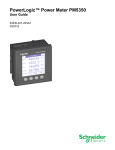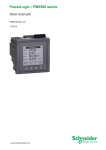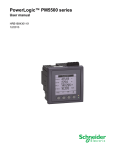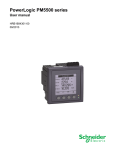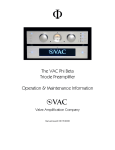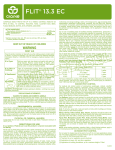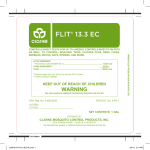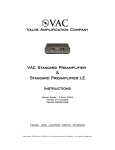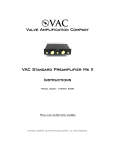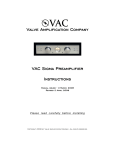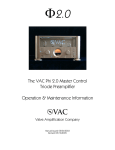Download VAC Renaissance Signature Preamplifier Mk II Operation
Transcript
VAC Renaissance Signature Preamplifier Mk II Operation & Maintenance Information Valve Amplification Company Manual issued 8/20/2002 Revised 08/09/2006, 07/12/2007 CAUTION THE POWER SUPPLY UNITS CONTAIN NO USER SERVICEABLE PARTS. DO NOT REMOVE THE COVERS. LETHAL VOLTAGES ARE PRESENT WITHIN THE CHASSIS. NEVER OPERATE THE PREAMPLIFIER WITH THE AUDIO CHASSIS COVERS REMOVED. BEFORE OPENING TO CHANGE TUBES, DISCONNECT THE PREAMPLIFIER FROM POWER AND ALL OTHER COMPONENTS, AND ALLOW IT TO SIT TURNED OFF FOR 30 MINUTES. DO NOT OPERATE THE UNITS IF THEY ARE WET. THE PREAMPLIFIER AND POWER SUPPLY UNITS ARE VERY HEAVY. BE SURE TO USE PROPER LIFTING TECHNIQUES TO AVOID BACK STRAIN AND INJURY. BE CERTAIN TO INSTALL IT IN A SECURE LOCATION FROM WHICH IT CAN NOT FALL OR TIP OVER. INDEX Introduction Installation Inputs (back panel) Outputs & Grounding Switch (back panel) Logo Illumination (back panel) Operation Front Panel Controls Remote Control Replacement of Tubes A Word About Tubes in General Warranty & Registration Form INTRODUCTION The Renaissance Signature Preamplifier is the world’s finest audio preamplifier and an absolutely unique component. Its unusual topology, premium parts, and flexibility make it a pleasure to hear and operate. The line stage is, in effect, a small Class A1 power amplifier, capable of driving loads as low as a few hundred ohms. This is a stark contrast to normal preamplifiers, which claim a low output impedance but completely collapse when asked to deliver current. The Renaissance Signature circuit has an internal 300 ohm output load, and is loafing with virtually any external load, delivering an effortless, musical performance. There is no loop feedback and no coupling capacitors in the line section. All active elements are triode tubes, the purest, most linear amplifying devices yet invented. Output matching is accomplished by way of superb output transformers. As a side benefit, different output grounding configurations are possible, optimizing performance into either balanced or single-ended loads, and allowing ground loops to be broken. The optional phono stage uses six twin triodes operating without loop feedback. Gain is moderately high, with a very low noise floor. Low output MC cartridges are accommodated by means of high quality matching transformers, which contribute voltage gain without noise, resulting in detail that emerges from a remarkably dark and neutral background. A completely separate power transformer and filter system is provided for the phono stage, eliminating all unwanted interaction with the line stage. Remote control is implemented via motorized mechanical devices. This is expensive, but provides two major advantages. First, the Signature Preamplifier controls are completely intuitive to use. Second, we avoid the sound degradation attendant with VCAs, relays, transistor switches, and switched resistor arrays. The massive chassis is machined from quarter inch thick aluminum plate and fitted with damping material for a strong, resonance-resistant structure. The half-inch thick fascia has a hand rubbed gloss lacquer finish. The audio circuitry and power supply are completely hand wired. The Renaissance Signature Preamplifier is designed not to the latest fad but to substance, for the highest possible sound quality. Time spent familiarizing yourself with this manual will be well rewarded. INSTALLATION 1) 2) 3) 4) 5) 6) 7) 8) 9) 10) 11) Provide adequate ventilation. Do not operate on carpet or any other surface that might block air flow. The chassis will become warm in normal use. Do not allow the chassis to touch any metal parts, such as the frame of an equipment rack. This might create a parallel ground path that could degrade the sound of your system. Input connection is via single ended RCA jacks or XLR jacks (which can be from balanced or unbalanced sources). Output can be on RCA or XLR jacks, and can be set for balanced or unbalanced loads, with or without ground connection at the preamplifier. IMPORTANT: READ THE SECTION ON “OUTPUTS & GROUNDING SWITCH”. Connect line level inputs (CD, Tuner, Tape, etc.) to the appropriate RCA input jacks on the rear panel. Note: with the exception of Phono (when fitted), all inputs are “line level” Connect phono cables to the rear panel MM or MC inputs labeled “Phono.” Connect the ground wire from the turntable or phono cable to the “Ground” terminal provided on the rear panel. Set the MM / MC switch to reflect the input jacks being used. Connect the power cables from the power supply to the preamplifier. Note that each has a locating key and a locking collar. Be sure to insert the connector properly, and fully tighten the locking collar. Connect the input and output cables. Connect the power supply to the correct voltage source. The voltage may be selected by means of the removable selector card located underneath the fuse in the power connector. Remove the cards and reinstall so that the desired voltage may be read. Avoid power conditioners that float the ground pin. ALWAYS connect power cord to component before plugging it into an AC outlet, and make sure that unit’s power switch is set to the “off” position before making the final connection. For best performance, try to route the power cord away from signal cables. Pay close attention to power quality, and be aware that different power cords can alter the sound. The backlit meters show variation in power line voltage as reflected to the audio circuitry. Set the logo illumination switch to bright, dim, or off. INPUTS (back panel) There are five line inputs. Three pairs (L1, L2, L3) have RCA jacks to accommodate unbalanced line level sources. The other two inputs (L4, L5) can accept either RCA unbalanced or XLR balanced sources; by each of these sets of jacks is a toggle switch that must be set to the correct mode. Note: not all sources with XLR connectors are balanced. Many are unbalanced, with pin 2 or pin 3 tied to ground. The Signature Preamplifier accepts such sources, as well as true balanced sources. One pair of RCA jacks accommodate a home theater surround sound processor (left & right front channels). When the CINEMA selection is made, the output from the processor is routed directly to the power amplifier at a fixed gain. This allows volume levels to be under the sole control of the processor, allowing easy integration of your high-end stereo system into a home theater system. When no processor is connected, please keep shorting plugs in these jacks. One pair of RCA jacks accommodate the monitor return from a tape deck. If you do not have a tape deck, these jacks can be used as an additional input. Units without the optional phono section have two RCA jacks labeled “MC”. These act as a line level input (L6), engaged when the SELECTOR is set to “PHONO”. Units with phono have two sets of RCA jacks, labeled “MC” and “MM”, to accept phono cartridges of low or high output. The switch should be set to “MM” or “MC” to match the inputs used. The ground lead from the turntable should be connected to the binding post located by these jacks. OUTPUTS & GROUNDING SWITCH (back panel) One pair of RCA jacks provide line level output to a tape recorder. The level of signal is not adjusted by the volume control. Two sets of RCA output jacks are provided as main outputs to power amplifiers. In addition, one pair of XLR jacks can be used to drive a power amplifier. The GROUND switch must be set correctly for the output configuration being used. Incorrect setting will result in either excessive buzz, or cause gross distortion of frequency response and output. For power amplifiers with RCA input jacks, you will normally use the “RCA GND” setting. You may also choose “XLR/RCA UNGND” if it is necessary to break a ground loop. For power amplifiers with XLR input jacks, you must determine if the input is truly balanced, or if either pin 2 or 3 is actually tied to ground (unbalanced XLR). For true balanced inputs you may choose between “XLR GND” and “XLR/RCA UNGND” for lowest hum level. For power amplifiers with unbalanced XLR inputs, select “XLR/RCA UNGND”. If the amplifier ties pin 3 to ground, you may also use “RCA GND”. Do NOT use “XLR GND”. LOGO ILLUMINATION SWITCH (back panel) The logo may be set for bright, dim, or no illumination. Since the logo light also functions as the mute indicator, we suggest that it be left on. OPERATION Before turning the power switch to the “on” position, mute the unit by moving the “Mute” switch to its clockwise (i.e., muted) position. You might also want to turn the “Volume” control fully counterclockwise. Mute is automatically engaged when switching on the unit. The mute state is indicated by the VAC logo being illuminated in red. When un-muted, the logo will be blue. (Note: the logo illumination may be set for bright, dim, or off via the rear panel switch.) Allow the preamplifier to warm up for a minute before you un-mute the unit; failure to wait can cause a transient to be sent through your power amplifier that might cause damage to your loudspeakers. As with all high fidelity products, the sound characteristic of the VAC changes somewhat as it warms up. Best sound will be achieved after about 15 minutes of operation. Any time that the VAC Renaissance Signature Preamplifier has not been used for a few weeks the sound may be different. This is also normal for high resolution audio equipment. Optimum sound should return after a few hours of operation, preferably with an audio signal. Please note that although your VAC System has been run for 48 hours at the factory, it will continue to "break in" for approximately 150 hours. Also be aware that many components display the need for a new break in period after being transported in unheated cargo aircraft. FRONT PANEL CONTROLS Although most of the front panel controls (Volume, Power, Mute) are self explanatory, VAC has outfitted this unit with several advanced features which bear further description: Phono Section: When fitted, input “PHONO" is connected to a discrete, pure tube phono preamplifier, providing 44 dB of gain, suitable for use with MM (moving magnet) and many high-output MC (moving coil) cartridges. An MC step up interface can be switched in for 64 dB of gain, making the Signature Preamplifier suitable for most low output cartridges. Monitor: The small knob found at the lower left-hand corner of the faceplate switches between “Source” and “Tape”. In the “Source” position, input selection is determined by the Source Selector Switch. In the “Tape” position, the Source Selector is overridden, and the Tape inputs are activated. Cinema: The small knob found at the upper left-hand corner of the faceplate switches between “Source” and “Cinema” (home theater pass-through mode). In the “Source” position, input selection is determined by the Source Selector Switch. The “Cinema” position provides access to one of the Signature Preamplifier’s most unusual feature. When set in the “Source” position, input choice is governed by the Input Selector switch. This is the normal setting, and enables the unit to be used as a typical preamplifier. Rotating the control clockwise to the “Cinema” position bypasses all preamplifier controls (including volume) and passes the output from your surround sound processor (i.e., the front left- and right-channel outputs of a multichannel processor) directly to your power amplifier. In this case, the users’ analog stereo sources would be connected, as usual, to the line, phono and tape inputs. A/V inputs (DVD, Laserdisc, DSS, etc.) would be connected to the home theater processor, and the processor’s main outputs would be connected to the pair of rear panel RCA jacks labeled “Home Theater Direct”. When the control is set to the “Cinema” position, the Signature Preamplifier functions as a pass-through ONLY, and is controlled by the external processor, preamplifier, or other component connected to the “Home Theater Direct” inputs. Mute: This knob is spring loaded; moving the control clockwise will toggle between the “Mute” and “Operate” condition. When muted, the VAC logo will be red; when un-muted, it will be blue. On occasion the preamplifier may seem not to have responded to a turn of the “Mute” knob; this is due to “contact bounce” in the switch. Simply turn the knob again until the desired condition is attained. Meters: The power supply has two backlit meters. One monitors the output voltage of the heater supply to the line stage, the other monitors the high voltage supply to the line stage. These will vary somewhat due to power line voltage, and, to a lesser degree, tube condition. The target condition has the needle aligned with the ball indication in the center. REMOTE CONTROL The remote control allows for wireless adjustment of MUTE and VOLUME. The remote wand is powered by two “AAA” batteries. These should be of the alkaline type. You will need to install them in the wand before using the remote. Since batteries can leak, they should be removed from the wand if it is not going to be used for an extended period of time. Mute: Pressing either side of the “Mute” button will toggle between the “Mute” and “Operate” condition. When muted, a red glow will be observed in the LED indicator. Mute is automatically engaged when the preamplifier is first switched on. Volume Up/Down: These buttons cause a motor to turn the volume control; the more briefly you press the control, the smaller the motion of the volume control. Motorized controls offer superior sound, as well as direct visual indication of volume setting. The front panel control may also be used directly in the conventional way. Note: Your remote control wand may contain buttons for additional functions, but these are not active with the Signature Mk II Preamplifier. REPLACEMENT OF TUBES Refer to the figure (below) for the location and types of tubes. -----------------------------------------------------------------------------------------back----| |12AX7 12AX7 |Low noise Low noise no tube no tube | | |12AX7 12AX7 8416 8416 | | | |12AX7 12AX7 12AU7 12AU7 | -----------------------------------------------------------------------------------------front----^ ^ ^ ^ Phono Phono Line Line Left Right Left Right | | | | | | | | | | | Due to the unique nature of the VAC Signature, we strongly recommend that you use only tubes specifically selected and tested by VAC for this application. DANGEROUS VOLTAGES EXIST WITH THIS COMPONENT. YOU MUST FOLLOW THESE STEPS TO PROTECT YOUR SAFETY. Before replacing tubes, all power must be turned off. Unplug the power cord from the wall, and remove all audio interconnect cables. Wait 30 minutes before removing the top cover. Install new tubes of the appropriate types firmly in their sockets, noting the location of holes in the socket and pins of the tubes, taking care to make sure that pin pattern corresponds to holes in tube socket. Reinstall the top cover before reconnecting the unit. NEVER INSTALL OR OPERATE THIS UNIT WITHOUT ALL COVERS IN PLACE. In the event that trouble is encountered, check all signal, speaker and power connections. If the problem persists, follow all safety precautions stated earlier in this section, and check that all tubes are correctly seated in their sockets. If possible, try another tube. If the problem persists, please consult your VAC dealer or contact the factory directly. CARE OF CHASSIS VAC chassis are machined aluminum for superior electromagnetic performance, and finished in durable textured gloss paint. Cleaning with a damp cloth WHILE THE AMP IS SWITCHED OFF AND UNPLUGGED should suffice. Do not get cleaning solutions onto or into the connectors or controls. When shipping your unit, be certain to wrap the amplifier in the cloth, tissue or plastic wrap in which it was originally packaged. Given the high gloss of the lacquered finish, make sure there are no ridges or sharp surfaces in those parts of the cloth which contact the faceplate. Use of a coarser cloth or failure to otherwise protect the faceplate may result in damage to the finish. VAC is not responsible for cosmetic damage resulting from improper care or packing. A Word About Tubes in General Tubes are like the tires on a car; they will eventually need replacement. Murphy’s Law states that a tube will probably fail right at the start of a long holiday weekend. Therefore, many audiophiles keep a spare tube of each type on hand, just in case! VAC can test tubes for concerned customers. WARRANTY Your equipment is warranted for a period of thirty (30) days from the date of purchase. In addition, if the registration form is received by VAC along with a copy of your sales receipt from an authorized VAC dealer within this thirty days, a service contract will be extended to cover your equipment for two (2) years (tubes excepted). It is the responsibility of the dealer and customer to determine suitability of this unit for a particular application. This warranty applies only to units sold in the United States of America through authorized VAC dealers and operated in the USA by the original owner. It covers factory service and, within the continental U.S., standard return shipping. For warranty information outside of the U.S. contact the importer of VAC equipment for your country. Units sold outside of the U.S. should still be registered with VAC. Your questions and comments are always welcome. Contact: Valve Amplification Company 1911 East Avenue North Sarasota, FL 34234 Telephone 941/952-9695 [email protected] Fax 941/952-9691 _____________________________Detach and mail to the address above as soon as possible.____________________________ Renaissance Signature Preamplifier Mk II Registration Form Name ________________________________________________________________________ Address ________________________________________________________________________ ________________________________________________________________________ Telephone _______/_______-_____________ e-mail __________________________________ Dealer name ________________________________ City ____________________________________ Salesperson ___________________ Purchase date ____________ Serial Number ________________ How did you first learn of VAC products? ____________________________________________________ What other brands/models did you consider? _________________________________________________ _____________________________________________________________________________________ What made you decide on the VAC? _______________________________________________________ _____________________________________________________________________________________ What else would you like us to know? _______________________________________________________ _____________________________________________________________________________________ _____________________________________________________________________________________ Optional: What magazines do you read regularly?________________________________________________________ What are your hobbies (besides filling in warranty cards)? _______________________________________ What are your favorite types of music? ________________________________________________________ _____________________________________________________________________________________ _____________________________________________________________________________________ On what format? (CD, LP, DVD, SACD, MP3, etc.) ______________________________________________












